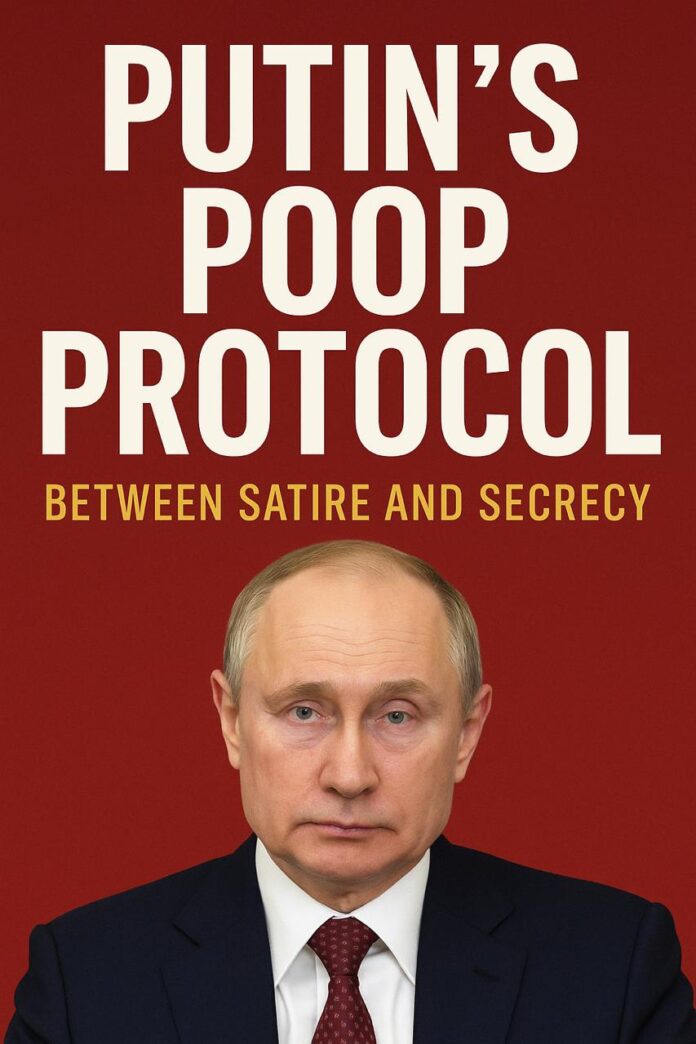A satirical article titled “Putin’s Magical Poop Briefcase Finally Breaks Its Silence” gained widespread attention, humorously personifying a briefcase allegedly used to transport Russian President Vladimir Putin’s biological waste during foreign trips. The fictional piece, portraying the briefcase holding a mock press conference to “clear the air,” underscores a real and peculiar Russian security protocol aimed at preventing foreign intelligence agencies from analyzing Putin’s excretions for medical or genetic insights. Observed during trips to France in 2017 and Vienna, this practice reflects the Kremlin’s intense secrecy surrounding Putin’s health, a critical factor in Russia’s centralized political system. As speculation about his physical condition fuels global curiosity, the “poop briefcase” has become both a serious espionage tactic and a viral internet meme. This article explores the origins, mechanics, cultural impact, and geopolitical implications of this protocol, drawing parallels with press freedom concerns, as of August 19, 2025, at 3:09 PM IST.
The Protocol: Fact Behind the Satire
Mechanics of the Protocol
-
Operational Details: Since at least 2017, reports indicate that Putin’s Federal Protective Service (FSO) agents collect his urine and feces during international visits, storing them in sealed containers within a discreet suitcase. These are flown back to Moscow to prevent foreign analysis, as observed during trips to France (2017) and Vienna.
-
Security Rationale: The protocol safeguards sensitive health data, which could reveal medical conditions, genetic information, or vulnerabilities. In espionage, biological samples are valuable for assessing a leader’s physical state, potentially influencing geopolitical strategies or negotiations.
-
Intelligence Confirmation: Western intelligence sources have acknowledged this practice since 2022, noting its role in protecting Putin’s health privacy, a matter of state security in Russia’s authoritarian framework.
Historical Parallels
-
Royal Precedents: The protocol echoes historical practices where rulers’ bodily functions were tightly controlled. Louis XIV of France held court while using a hidden commode, turning private acts into displays of power. Similarly, English monarchs employed “Groom of the Stool” officials to manage their waste, intertwining personal care with political symbolism.
-
Modern Espionage: Advances in biotechnology have elevated biological waste to a potential intelligence asset, justifying Russia’s extreme measures. The briefcase reflects a contemporary adaptation of historical secrecy in an era of advanced surveillance and medical analysis.
Satirical Amplification and Cultural Impact
The Satirical Narrative
-
Article Overview: The August 2025 satirical piece personifies the briefcase as a weary, outspoken entity, humorously complaining about its wear-and-tear, deflecting health rumors about Putin, and joking about being replaced. The parody transforms a serious security measure into a comedic narrative, highlighting the absurdity of Kremlin secrecy.
-
Cultural Resonance: By giving the briefcase a voice, the satire captures global fascination with Putin’s health and Russia’s opaque governance, turning a clandestine protocol into a widely discussed topic.
Social Media and Memes
-
Viral Spread: The “poop briefcase” has become a global meme, with captions like “KGB: Keep Garbage Back” and mock travel slogans such as “Visit Paris, leave only footprints—unless you’re Putin.” Posts on X amplify this humor, reflecting public intrigue and ridicule.
-
Public Engagement: The memes underscore satire’s power to challenge authoritarian control, making Putin’s paranoia a subject of global amusement while raising awareness of Russia’s information lockdown.
Geopolitical and Press Freedom Implications
Health Speculation and Political Stability
-
Health Rumors: The protocol fuels speculation about Putin’s health, with analysts noting possible signs of Parkinson’s or other ailments based on his gait, hand tremors, or facial expressions. The Kremlin dismisses these as “Western wishful thinking,” but the secrecy intensifies curiosity.
-
State Stability: In Russia’s centralized system, any perceived weakness in Putin could destabilize political structures, echoing concerns about czars and Soviet leaders. The briefcase symbolizes this fragility, as health rumors could embolden domestic rivals or foreign adversaries.
-
Geopolitical Strategy: Controlling health narratives is critical for Putin’s image of strength, especially amid ongoing conflicts like the Russia-Ukraine war, where leadership stability influences global perceptions.
Press Freedom Parallels
-
Global Context: The satire’s prominence coincides with press freedom concerns, such as the sedition charges against Indian journalists Siddharth Varadarajan and Karan Thapar for sensitive reporting. Both cases highlight tensions between state control and media freedom, with satire and journalism challenging official narratives.
-
Media’s Role: The ability to publish such satire reflects the press’s power to critique authoritarianism, though it risks retaliation in Russia, where independent media face severe restrictions, as seen in the 2024 closure of outlets like Novaya Gazeta.
Challenges
-
Secrecy’s Paradox: While the protocol protects Putin’s health data, it fuels speculation and satire, potentially undermining his image of invincibility. The Kremlin must balance secrecy with managing public and international perceptions.
-
Diplomatic Strain: The protocol’s visibility during foreign trips may strain relations with host countries, who could interpret it as a sign of mistrust, complicating diplomacy.
-
Media Risks: Satirical coverage risks provoking Kremlin crackdowns on domestic and international media, as seen in Russia’s history of censoring critical voices like Radio Free Europe in 2023.
-
Domestic Trust: Excessive secrecy could erode public confidence in Putin’s leadership, particularly if health rumors intensify amid economic or military challenges.
Opportunities
-
Satire as Resistance: The satirical narrative, amplified by global media and social platforms, offers a non-violent way to critique authoritarian control, fostering public discourse on transparency and governance.
-
Intelligence Awareness: The protocol highlights the growing role of biological intelligence, prompting nations to strengthen data security measures, as seen in India’s tightened FDI norms for IT and data sectors in 2025.
-
Cultural Commentary: The briefcase’s meme status provides a lens to examine state power and secrecy, encouraging global audiences to question authoritarian practices.
-
Media Resilience: Independent media, facing pressures like those in India, can draw inspiration from such satire to persist in challenging state overreach, bolstering press freedom advocacy.



